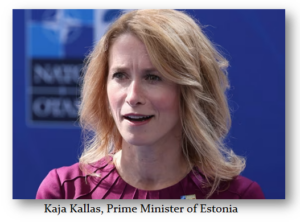The Kallas Quandary: A Deep Dive into EU Diplomacy and Military Strategy
At Extreme Investor Network, we delve into the intricate world of global economics and policy, unraveling the complexities that shape our geopolitical landscape. Today, we turn our attention to a critical player in European diplomacy—the European External Action Service—led by Kaja Kallas, whose recent actions have sparked considerable debate among European diplomats and leaders.
The Role of the European External Action Service
Established to promote diplomacy and maintain peace across Europe, the European External Action Service (EEAS) is a crucial institution guiding the European Union’s foreign policy. However, the appointment of Kaja Kallas as the head of the EEAS has brought a controversial shift in focus. Kallas, a prominent neoconservative figure, previously served as Estonia’s Prime Minister and has been vocal in her stance regarding the ongoing conflict in Ukraine. Her assertive declaration that "the European Union wants Ukraine to win this war" has raised eyebrows and angered several European diplomats who feel her tone is more akin to a wartime general than a diplomat.
A Diplomat or a Political Strategist?
Her recent tweets, including radical critiques of former U.S. President Donald Trump—where Kallas claimed “the free world needs a new leader”—highlight a tendency to act beyond the formal bounds of diplomacy. Instead of fostering dialogues, Kallas has opted for aggressive posturing, issuing what many have termed the "Kallas Plan," demanding substantial military aid, including 1.5 million rounds of ammunition for Ukraine, and putting pressure on all 27 EU member states to comply.
This unilateral approach elicited backlash from various European leaders who viewed her demands as coercive, especially as they were tied to each country’s economic capacity. Such actions raise vital questions: How can one unelected official navigate the intricate economic and political realities of 27 unique nations? And what are the potential long-term implications for Europe’s financial stability and unity?
A Continent at a Crossroads
Kallas’ decree not only signifies a shift in the EU’s military strategy but also exacerbates existing tensions among member states. Political dissatisfaction is palpable, particularly in Southern Europe, where economic constraints make significant military contributions untenable. The broader strategy appears to aim at enhancing Europe’s military capacity just as NATO’s traditional outspokenness seems to wane.
One anonymous EU diplomat’s comment likening the current situation to 1938 suggests an alarming urgency; however, it simultaneously indicates a possible miscalculation of the realities facing European nations today. The notion of invoking wartime rhetoric to justify military expenditures could risk deepening economic divides and social unrest within member states.
Understanding the Bigger Picture
The challenges presented by Kallas’ approach illuminate the larger crisis facing the EU. While the bureaucracy in Brussels aims for collective solutions, the reality remains that blanket policies cannot comprehensively address the unique contexts and hardships experienced by each country. For instance, Hungary’s recent silencing for opposing the EU’s aid package is emblematic of the friction between the EU’s overarching policies and national autonomy.
Moreover, Kallas’ potentially unchecked ambition—evidenced by her aspirations to lead NATO in the future—could lead to policies that jeopardize not only Europe’s relationships with Russia but also its own financial stability. We at Extreme Investor Network argue that such a trajectory could have lasting ramifications for the economies of member states at a time when economic recovery is crucial.
Conclusion: A Call for Strategic Diplomacy
As we navigate these turbulent waters, it’s essential for EU leaders to reclaim the narrative from the realm of unelected bureaucrats and prioritize diplomatic solutions over military aggression. The future of Europe must be rooted in collaboration—a critical factor in ensuring that Europe remains politically stable and economically viable.
At Extreme Investor Network, we’re committed to providing insights that challenge prevailing narratives and promote a deeper understanding of the interdependencies that shape our global future. As the EU grapples with its identity and strategic direction, we encourage readers to stay engaged and informed as these developments unfold. The stakes for Europe—and indeed the world—have never been higher.

